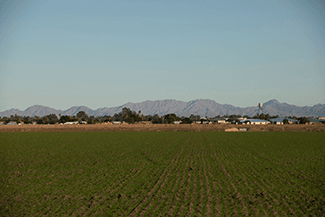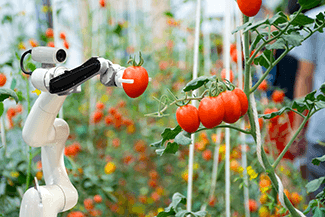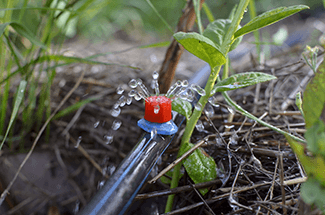Importance of Agricultural Technology
Farmers no longer must apply water, fertilizers, and pesticides uniformly across entire fields. Instead, they can use the minimum quantities required and target very specific areas, or even treat individual plants differently. Benefits include:
 Higher crop productivity
Higher crop productivity- Decreased use of water, fertilizer, and pesticides, which in turn keeps food prices down.
- Reduced impact on natural ecosystems
- Less runoff of chemicals into rivers and groundwater
- Increased worker safety
In addition, robotic technologies enable more reliable monitoring and management of natural resources, such as air and water quality. It also gives producers greater control over plant and animal production, processing, distribution, and storage, which results in:
- Greater efficiencies and lower prices
- Safer growing conditions and safer foods
- Reduced environmental and ecological impact.
Various Areas of Agricultural Technology
Seed Technology
- Hybridized seed to develop certain traits.
- Biotech seed (GMO)
- Often improved traits were developed to resist pests and weed. Today, we have Golden Rice with beta-carotene, vitamin A, built into it to prevent blindness in young children, especially in developing countries.
- As more research is done, only gets better
- Plus, we have better preservation occurring of some of our ancient foods, like ancient grains. Tepary bean, native to our Native American tribes.
Robotics and Sensing Technology
Crop monitoring and livestock monitoring are taking on a whole new level of innovation.
 Greenhouses devoted to fruit and vegetable production, engineers are exploring automation to reduce costs and boost quality.
Greenhouses devoted to fruit and vegetable production, engineers are exploring automation to reduce costs and boost quality.- Devices to monitor vegetable growth, as well as robotic pickers, are currently being tested in both the UK and America (could eventually solve agriculture’s labor shortage crisis).
- For livestock producers, sensing technologies can help to manage the health and welfare of their animals (‘Animal trackers’).
- Sensors and monitors are being designed to improve monitoring and maintenance of soil quality.
- Although some of these technologies are already available, most are at the research stage in labs and spin-off companies.
- In Yuma, you can find a big black box (looks like an oversized refrigerator) going down rows of early-growth produce looking for weeds, when found the unwanted plant is zapped and killed with a laser.
- Drones and robotics might even be used to detect pest infestations and target specific pesticide applications. 20 to 40% of global crop production is lost to pests.
One Tech Example
Boulder, Colorado-based agriculture data analysis company Agribotix, supplies drones and software that use near-infrared images to map patches of unhealthy vegetation in large fields. Images can also reveal potential causes, such as pests or problems with irrigation. The company processes drone data from crop fields in more than 50 countries. It is now using machine learning to train its systems to differentiate between crops and weeds and hopes to have this capability ready for the 2017 growing season.
Mechanical
- Look at the tractor today versus 100 years ago.
- Autonomous Tractors. We were autonomous when autonomous wasn’t cool.
- Almost too much technology built into it.
- New Memorandum of Understanding with the major manufacturers that ensures farmers and ranchers Right to repair their own equipment.
- Farmers are always in partnership with the smaller dealers/manufacturers and often can customize a piece of equipment to maximize efficiency on a particular farm. [Noah Hiscox]
Irrigation Technology
 Pivot
Pivot- Siphon
- Soil probes for soil moisture
- Drip
- Sprinkler systems
Agriculture’s connected future: Agriculture’s technology future: How connectivity can yield new growth | McKinsey
A white paper from McKinsey and Company shows that all this technology must be underpinned by a connected future.
“Now, agriculture is in the early days of yet another revolution, at the heart of which lie data and connectivity. Artificial intelligence, analytics, connected sensors, and other emerging technologies could further increase yields, improve the efficiency of water and other inputs, and build sustainability and resilience across crop cultivation and animal husbandry,” say the paper’s authors.
What Does Arizona Agriculture Look Like in the Future?
“I have been asked many times in the last few years, ‘What does the future look like for Arizona agriculture?’ I don’t really know what it will look like 30 or 50 years from now. But what I do know is that whatever it looks like, it will be a shining example to the rest of the world. We will innovate and persist even in challenging times.”
“The farmers and ranchers will be battle tested and will be the children and grandchildren of all of us today. They will be successful because we have shown them how to keep going and thrive despite their circumstances. It just depends on our response!” – Stefanie Smallhouse
###
Homeowner Handbook | #AgAdvancements
PODCAST
Predicting the future of Arizona Agriculture is a tall task with ever changing resources and technology. Whatever it looks like, it will be a shining example to the rest of the world. Arizona Farm Bureau’s Julie Murphree is joined by Curry Farms’ Ed Curry to discuss those technologies in mechanics, irrigation, seed genetics and growing crops with natural benefits using less water. Plus Ed is well known for chili genetics. His work is in just about every product using chilies.
Podcast Archive With Expanded Content and Resources
PHOTO CREDIT
- Shutterstock
















